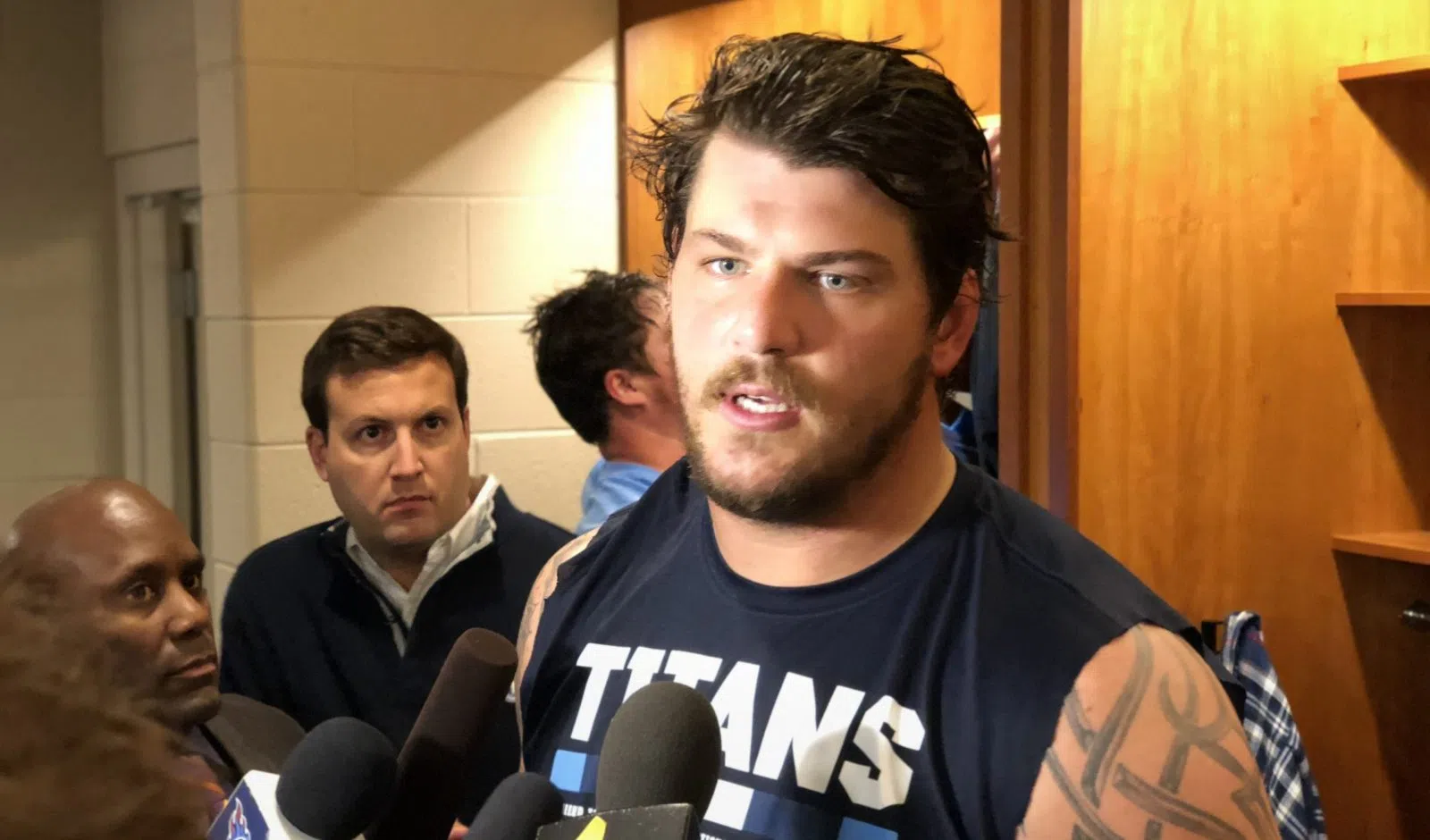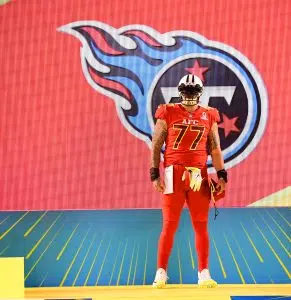Buck Reising, Tennessee Titans reporter and host of Tackling Music City, discusses the risks and rewards of the team prolonging a contract extension for left tackle Taylor Lewan.

Nashville, TN – November 12, 2017 – Nissan Stadium: Taylor Lewan (77) of the Tennessee Titans after a win over the Cincinnati Bengals (Photo by Chas Kelly / Cromwell Group).
NASHVILLE, Tenn. — Conversations about money are hardly ever comfortable; particularly when it’s another person’s bank account you are discussing. But, with so little to talk about in the NFL at this time of year, the most glaring story line for the Tennessee Titans is the looming contract situation of left tackle Taylor Lewan.
Tennessee’s policy, as is the case with most professional sports franchises, is to refrain from commenting on negotiations with any of its players. But the team has yet to discuss a possible extension with the two-time Pro Bowler, according to Lewan as of last Wednesday.
The question is: what, exactly, are they waiting for?
“I understand that this is a business, and so if something gets done here that’s great,” Lewan said, following Day 5 of the team’s voluntary OTAs. “But if not, I understand and that’s how it is. That’s how this game works, so whatever happens, happens.
“If something gets done and both parties are happy, then I think something will get done. If not, then it’s a business. I can’t sit here and say what the future’s going to be. But as of right now, I’m playing on my fifth-year option and I’m going to do my best to make sure that this team is as successful as possible this year, and hopefully continue for this offensive line to take steps forward and try to be the best left tackle I can be.”

Orlando, FL – January 29, 2017 – Camping World Stadium: Taylor Lewan (77) competing in the 2017 NFL Pro Bowl
(Photo by Scott Clarke / ESPN Images).
Selected by the Titans out of Michigan 11th overall in the 2014 NFL Draft, the fifth-year option is a way for clubs to extend a first-round pick’s rookie deal to give the player and the team more time to hash out a long-term extension. Lewan heads into the 2018 season set to play on the final year of his first contract under this fifth-year stipulation at a base salary of $9.341 million.
The highest paid player at the position is Nate Solder, signed by the New York Giants in free agency this year. Big Blue inked the former New England Patriot to a four-year, $62 million deal, with $34.8 million guaranteed.
It is there that the benchmark is set.
To be clear, there have been no indications that talks between Lewan and the team have been any kind of contentious. The left tackle has been present at all of Tennessee’s voluntary workouts and Lewan has comported himself with nothing but professionalism when discussing the matter. His comments last week, I’m sure, were music to general manager Jon Robinson’s ears.
But who truly benefits from prolonging the inevitable?
“It’s odd. (For a player) of that magnitude,” says former NFL agent/CBS Sports contributor Joel Corry of Lewan’s situation. “First of all, there was a mistake made, in my opinion. Why did you need to extend (defensive lineman) Jurrell Casey with two years left when he’s already had one big contract and you had your left tackle that you could have done with two years left, which wouldn’t have been unprecedented. Nobody in (Lewan’s) draft class got it but there have been guys the year before who were done after playing three seasons.
“When you’ve got a young player at a premium position, it’s going to cost you more in the long run. We saw that last year; you’re talking in the Russell Okung neighborhood (4 years, $53M), Nate Solder, who was a slightly above-average left tackle gets $15.5 million a year. So, yeah, there goes the new floor or at least it’s going to raise the ballpark for Taylor Lewan.”
2000+ miles away in Los Angeles, a precedent exists for what can go wrong if these situations linger with the contract dispute between reigning Defensive Player of the Year Aaron Donald and the Rams. LA has been reluctant to give Donald what will be an enormous payday. Picked two spots after Lewan in 2014, the defensive tackle has shown his displeasure with the franchise that drafted him by skipping voluntary OTAs.
Other players on that roster have begun to take notice.
Rams cornerback Marcus Peters, who was acquired via trade with the Kansas City Chiefs, was asked in a press conference two weeks ago about the situation between his new employers and Donald.
“Pay the man,” Peters said. “I mean, s—. You win the (Defensive) MVP? Come on now.”
It should be said that Peters has a vested interest in the handling of Donald’s contract, seeing as the corner will be going through the same process next season. It does, though, speak to a larger point about how players view their respective front offices and how that image can be sullied if they feel they or their teammates are not being adequately rewarded for the sacrifices they make on the field. As in any business, if the employees feel that they have proved their worth and that management is not treating them as such, the results on the working environment (or locker room) can be poisonous.
Correctly rewarding the right core individuals, though, can pay unimaginable dividends.
When Philadelphia Eagles GM Howie Roseman returned from the proverbial personnel desert from whence (not Wentz) former coach Chip Kelly sent him during that well-documented power struggle, his first actions were to reward the team’s deserving young stars.
Welcome to Nashville! #NFLDraft @visitmusiccity@KingsOfLeon and @TaylorLewan77 are ready to party! pic.twitter.com/snJbSfYzte
— Tennessee Titans (@Titans) May 23, 2018
“Once you start investing in a core group of guys … if you’re one of those guys, you say, ‘OK, they want me here, and I have ownership of what’s happening here,’” Philly safety Malcolm Jenkins told The Ringer. “And if you’re not one of those guys, you see, ‘OK, if I invest time, and I play well, and I perform, this team notices that.’”
The Donald/Rams disconnect stems from a variety of different factors that do not apply to Lewan’s situation in Nashville and the Roseman/Eagles saga is fairly unique. The lessons that can be taken from both, however, are invaluable.
The Titans can afford Lewan, they need him and, while he ceases to be a player at value with a new, high-priced deal, the message it sends to the locker room is just as important: Play well and you will be rewarded. Have faith in the organization that has brought you this far.
Robinson’s position is unenviable. This is one of many difficult financial decisions he will be forced to make with a team he has done so well to replenish. Quarterback Marcus Mariota will face the same fifth-year purgatory in 2019 and Lewan’s All-Pro counterpart, Jack Conklin, will be due big money soon enough. Robinson’s obligation is, first and foremost, to put the team in the best position to succeed and, while the cap situation in Nashville looks favorable now, there is a surplus of young talent that will need to be paid.
But, as an offensive lineman, Lewan is a part of the literal foundation that Tennessee has built upon to create one of the most complete rosters in football. He was drafted into an unenviable situation by one of the league’s most irrelevant teams and, along with many other longer-tenured Titans, suffered through more losing than most people whose careers are based on ultra-competitiveness should have to endure.
Lewan started 53 of 58 regular season games (all 32 in the last two seasons), made two consecutive Pro Bowls and helped clear the way for the franchise’s first playoff run in over a decade. Any concerns about Lewan’s off-the-field antics have faded quickly with both his evolution as a professional and the growth of his young family and the on-field outbursts that made him an officiating target have also seen a marked decrease. The Titans left tackle is a rabid protector of Mariota, a beloved figure in the community and an engaging personality that his team does not hesitate to traffic in to engender the support of its fans.
Lewan has put his time and faith into the team that drafted him. He should not have to wait to reap the rewards.
To quote Peters, “Pay the man. I mean, s—.”









Comments